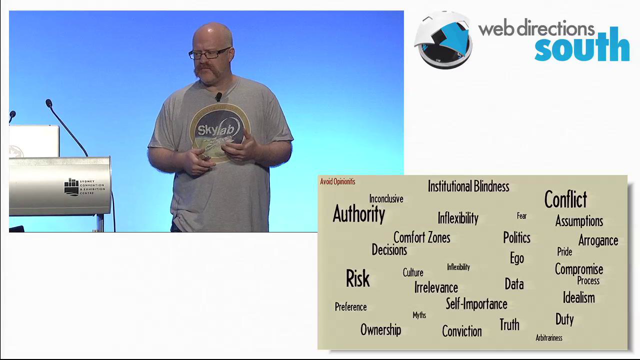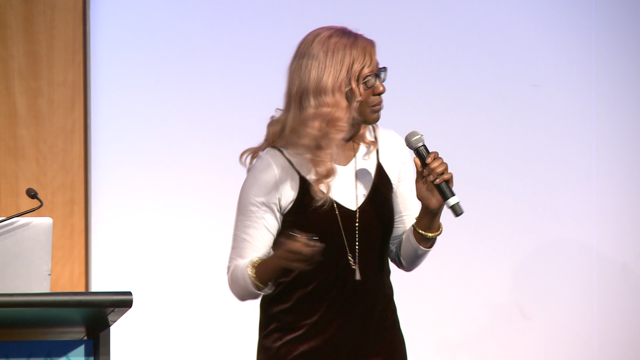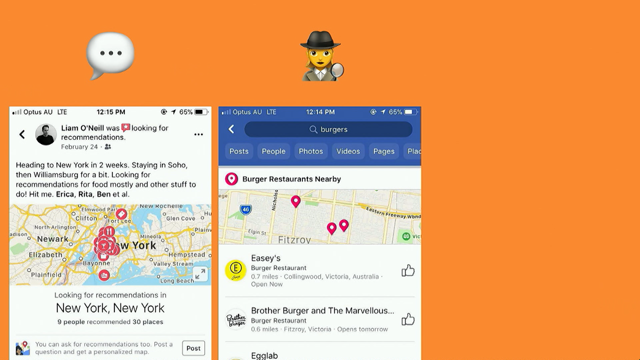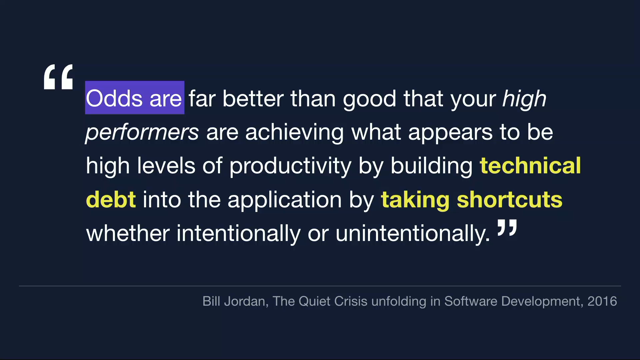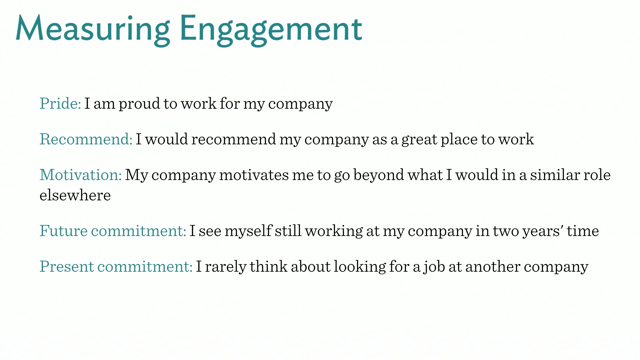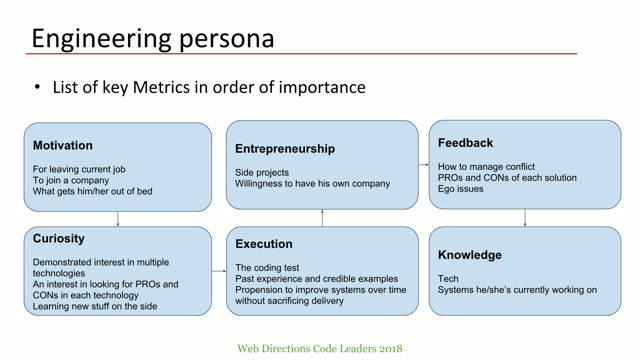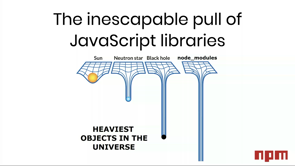Being the nice guy with the bad news

(upbeat music) (applause) - Thanks, John.
I've just made a slight correction to my slide deck. It really annoyed me when I sent this through, 'cause the title's pretty cute, but it goes against some of the feelings that I've got in terms of language being inclusive, so I hope you're OK if I've made a slight adjustment to my slide deck.
Yeah, as John mentioned, I've just recently joined Deputy as a delivery manager, so Culture Amp, you should get delivery managers, they're amazin'. I'm a newly-minted one.
I think I'm pretty awesome at what I do, hopefully, but I've been in tech for around 20 years.
I, too, have been like the ActionScript developer, I've been the table layouts person, I've done all of those kinds of things, and in the last three years, I've moved into roles which are more around support and leadership for teams, so steppin' away from the day-to-day coding side of things, and really lookin' to unlock the potential that teams can have.
As John mentioned as well, I also run SydCSS, which is the best tech meetup in Sydney, if not the world.
If not the world, I know there's a few other people from other meet-ups here.
I will disagree with you until the cows come home. I even outsourced whether I should have this beard or not to the community.
They decided that I should present today with a beard, and I love that community, with all my heart. With both this side of my life, this community side of technology, and the day-to-day job that I do at Deputy, I use empathy a lot as part of my skillset. And I use empathy to be able to understand and put myself in the position of the people who I'm supportin' to help remove obstacles that they might have, or to unlock their real potential that they've got.
And this talk is about how I balance those empathy skills, how I balance understandin' people and caring for people, how I balance that with deliverin', sometimes, some bad news to people.
Some correctional feedback that I might need to give, or somethin' that needs to put them in a direction that they weren't necessarily headin' down. So this talk is about how I balance those two things, because this is important for us as leaders to be able to find this balance, because if we don't find it, if we're one way or the other, then we're not gonna unlock the potential that we've got in the teams that we've got. This became an important topic for me about a year ago, where I'd stepped into a new role with a new team that I'd inherited.
There was a little bit of dysfunction in that team. Some people didn't get on with each other, there was a bit of friction.
Some of the developers also weren't performin' at the level that was expected of them, and I'd inherited this team, and I started to really doubt myself as a leader and as a support person, and I started to think, "Well." I literally was looking up post offices in Tasmania as a potential option for me to go down as an alternative career path.
So I did a bit of a stupid thing at this point. Rather than really reflectin' properly on what I was doin', I put myself up for a job at a big tech company, and because my headspace was not in a good place, and imposter syndrome was kickin' in for me, I'd really didn't do a very good job in that interview whatsoever.
And this is the inevitable email that came back to me, that my communication was strong durin' the interview, and I had good answers for what makes high performing team, go me.
However, I needed growth around giving feedback and performance management.
And this really could've sent me down one or two paths, right? I could've gone further down a rabbit hole, I could've gone and bought that post office down in Tasmania.
I still dream of that.
What I chose to do instead, I chose to really knuckle down on researchin' what it is for me to be a leader and the type of leader that I want to be, and also to focus on this bit of feedback that I've got, around this area of growth I need, this weakness that I've got.
So I was hittin' up audiobooks, bloody dusted off the Kindle.
I was just taking in as much information as I possibly could.
And as I went through this process, a couple of key things kind of came out from this. One is that trust is integral to the teams that I support, to really unlock their potential.
And the other thing is that the reverse is true as well, so if there is an absence of trust within the teams that I'm supportin', then they're never gonna performance at the level that they're, that I want them to. And there's also goin' to be a breakdown in communication, there's gonna be a lack of sharing.
There's gonna be things like, I've seen it with some developers that aren't trusted where the PRs get absolutely slammed every time it goes up. And it's all to do with this deteriorating relationship where the trust isn't there, and so the team starts to go into survival mode, and they start to potentially actively sabotage themselves and other teams.
Now, needless to say, I don't wanna go down this road with the teams that I support, but it's something that I've gotta keep in mind in terms of finding this balance and the way that I support them.
So, on a slightly lighter note, in the research that I was doin', I found that I didn't know a name for the type of leadership that really resonated with me. I'd modelled myself on people that I really respected in the way that they treated me, and so I didn't have a focus for me to be able to do the research, but what I discovered this term, which is a servant leader, where they share the power, and puts the needs of the employees first, and helps people develop and perform as highly as possible.
This really resonates with me with the style of leadership that I just naturally was formin'.
This isn't a new term, as well.
This is from the '70s, so I don't know how I missed this, so thank you managers who have led me in the past and not given this term to give me the focus, thank you very much.
But this really gave me a focus in terms of research that I do, and try to glean things off how I can shape myself.
I also found that I use those empathy skills as the cornerstone of how I build trust within the teams that I do lead, and this lays a foundation for psychological safety.
Now, psychological safety is, it's seem to be the nirvana, at the moment, of what we're shootin' for.
Google did some research on this with their project Aristotle, and they found that this was the number one trait of a high-performin' team.
It's not just one of the traits for the team. It's the number one trait for the high-performin' teams that they have at Google, so I wanna be shootin', I wanna be shootin' for this.
So those are things that I feel comfortable with in terms of relatin' to teams and things, but there this other side of things which I'm weak, and I'm not so good at, and that's the feedback side of things, so how do I develop these skills? If I think back, if I reflect on what I was as a leader in the first couple of years of doin' leadership, then I probably did shy away sometimes from givin' people correctional, directional feedback, because I kinda hoped that they would just get it, and they would course-correct on their own, without my intervention, and so you end up with these sleepless nights, hopin' that people will somehow miraculously get it. But they're not gonna, right? They're not gonna, unless you give them feedback. So the real light bulb moment for me was that there was a connection between that trust that I build with the team members that I support and the way that I can deliver feedback, and I never knew this.
That I could be incredibly direct with those people when I'm givin' the feedback, because they trust me. They know that the feedback that I'm givin' is comin' from a really sincere place, and my interests are in their future, and in their best interests.
There's a key paragraph from, I don't know if anybody's read Radical Candour. It's pretty popular at the moment, but this paragraph in particular really resonated from me, and it made me change the way that I view the leadership style that I've got.
And the key thing's here, "When people trust you and believe you care about them, "they are much more likely to accept and act "on your praise and criticism "and tell you what they really think "about what you are doing well "and more important not doin' well." Those two things for me are the things that were the light bulb moment for me.
And then they lead into these next three, which is to "engage in the same behaviour with one another, "to embrace their role within the team, "and focus on getting results." And that to me reflects the idea that there's psychological feedback in place. Now, Kim Scott talks about this in terms of two dimensions, and these two dimensions are the two things that I was tryna balance in my life at this point. The first dimension that she talks about is that it's more than just bein' professional. It's about givin' a damn about the people that are on your team, like carin' about them, and it's also about takin' that, and encouraging the people who report into you to do the same as well, so it's about giving a damn.
The second dimension involves telling people when their work just isn't good enough, and also when it is, and this is that second dimension, the second side of things that I'm tryin' to balance, that is really the second half of things that I need to unlock to be able to bring teams up to the standard that I need. So I'm gonna focus a little bit on what I do to give a damn about the people that are on my teams. This side of things I find fairly natural and easy, and I've brought it down into three distinct areas. It's not about dogs.
Maybe it should about dogs, not sure.
Biggest thing that I do is around listenin'. So for me, listenin' is crucial in terms of what I do in supportin' people, because it allows me to build a relationship with that person, and it also allows me to understand things, get information on how they're feeling about things. And so how do I do this? One-on-ones are the classic things.
We all should be doing one-on-ones.
I make sure that I'm makin' time for that one-on-one. I very rarely move it within the schedule.
It can often be the thing that we move around, because we're very busy, and other things will come in, and we're tryna hit goals. But for me, for the people that support, I won't move the one-on-one, unless it's absolutely necessarily, because to think of it from their point of view.
If you're movin' that meeting around, it sends a signal that it's not as important as it should be, when really it should be one of the most important things that you're doin' in your week or in your fortnight.
When I'm listenin' to people as well, I'm payin' attention. I'm makin' sure that there's no things like notifications goin' off.
It's very easy to be distracted by telephones as I'm lookin' around the room lookin' at people that are distracted by telephones.
It's very easy to do that and take our attention away from listenin' to what a person has to say. It's also select notifications that come in on your bloody watch, on your laptops anyway, nowadays. So I try and remove distractions when I'm listenin' to people.
I also show interest in what the person's sayin', which sounds really dumb, right? But if you're asking probing questions as you're listenin' to somebody, it just means it's goin' in a little bit more, and it sends a good signal to that person that you are listenin' to what they have to say. I also use silence.
I'm the king of the awkward silence.
I don't move to fill that silence with just talk. I leave it awkward as possible, very awkward. And I let the other person fill that silence, because I'll often get insights at that point that puts someone's kind of mullin' over in their mind that will come out and will actually be quite a revelation. I'm also a bit of a body language nerd, that I characterise under listening as well. And this goes in two directions.
One is I'm very aware of my own body language when I'm doing things, and I'm also aware of the body language of the person that I'm listenin' to as well.
For example if I'm, again if I'm in a one-on-one or something, then if I glance up at the clock, then it's gonna send a signal to that person that I'm not really interested in any more of what they're talking about, when I might have just been curious about the time was, but the signal that it sends can be quite, yeah, it can be quite negative, and it can have an impact that you just don't necessarily expect.
On the flip side in terms of the body language that I'm observin', if I'm in things like stand-ups, I'm looking for changes in the way that somebody's behavin'. Recently I had somebody on the team that was, typically they would gesticulate a lot, but their body language switched to somethin' that was a little bit more defensive and the way that they were talking also became a little bit more defensive, so after the stand-up I spoke to them, asked if everything was OK.
And it turned out that, I feel as if this is gonna be like a dramatic pause now. Sorry, my mouth's a bit dry.
So it turned out that their grandmother had died recently, and they were actually stressed about gettin' time off work to go to the funeral.
It's like, of course you go to the funeral for your grandmother.
It's just work at the end of the day.
You've got to prioritise things in terms of family much more than that, and so that was a great relief for them to know that could go, and that stayed with them throughout the entire time that I worked with them, that they would often raise that time that I'd asked them if everything was OK, and spotted that something was wrong, and they referenced it as a point where they really, that I engendered trust in them.
Another thing that do on a regular basis, on a daily basis, is that I reflect and reflecting on things can seem really self-indulgent.
You kind of, I don't know, you're just sittin' in your chair, just thinkin' about things, but it's really important, because the way that you behave, and like a knee-jerk reaction sometimes might not be the reaction that's necessarily appropriate, or it's not the thing that's gonna help the team to be more candid in terms of the feedback that they're gonna be giving you.
So, reflection for me is very important, even without havin' things to reflect on from your teams. There's things you can think about here, around how you might be helpin' your colleagues achieve their goals, or you might be thinking about how you're hindering people from hittin' their goals, or you might think about a relationship that you've got with somebody at work that maybe isn't that great, and how can you, how can you mend that relationship or how you can improve it.
These are all things that you can reflect on, and then when you go and act on these things, it's done in a more considered way.
Gatherin' feedback from the teams is the key thing for me here.
I used to be a person where if I was gettin' feedback from somebody, like somebody from the team who wasn't happy with something, and I'd have a knee-jerk reaction.
I'd get super-defensive, and I'd give them an excuse or a reason for why I was behavin' in a certain way, but now what I'll do is that I'll take it onboard or thank them for the feedback that they're givin' me, and I'll take it away and I'll be more considered, and then get back to them.
And the effect that that has is that by thanking a person for the feedback that they givin' you, and especially if you can do that publicly in front of the team, it actually starts to build that as a thing that's just normal for the team as well. And when you start to do that, the whole cycle of feedback starts to get a lot easier.
The third thing I do, as well as gettin' out of bed, the third thing that I do is that I act.
So if I'm just listening and reflecting, which is lovely, if I'm just doin' those two things, then I'm just really a people-pleaser at the end of the day, and it's not really movin' the team forward. I need to act on the information that I'm gettin' from the teams, and from team members.
And sometimes, those things are gonna be what the team members can't act on themselves. So if there's problems within a couple of team members, and I've encouraged them to try and resolve it themselves, it may get to the point where I need to intervene. If I don't act, it's gonna have a detrimental effect on the team in the long-term.
So those are things, like I said earlier, those are things I'm fairly comfortable with. I'm gonna go into the area which I wasn't so comfortable with originally, is that tellin' people when something needs to change. So this is the second dimension that Kim Scott was talking about.
About tellin' people when things just aren't good enough. I am originally, no surprises here, I'm originally British. My upbringing in the 1980s was around not speaking ill of people, and being very polite and all that kind of stuff.
Innate in the nice guy personality that I put forward. But, yeah the slide that I've got here with the thing in the teeth.
I thought I was a person who would tell you if you've got in your teeth, not to make you paranoid, down there on the front row, but it turns out that I'm not, even though I've done all of this research, and I've started to implement this in the day-to-day side of the team.
I'm not a person who will tell you if you've got food in your teeth, because I don't wanna make you unhappy, and it's a bit awkward.
And so I'm battling this innate tendency, this personality that I've got, to shift my mindset away from being like that, to be somebody who can actually deliver difficult conversations sometimes, or corrective things, or behavioural switches that need to take place.
So my secret with this, is that empathy is actually a thing that enables me to help these hard conversations. I start to weigh up things like, if I'm not gonna have that awkward conversation with somebody, then I could be actually harming their career prospects in the future, dependin' on what the thing is that I need to have a conversation about.
So I'll weigh up, is it hard to have that initial conversation, like a few minutes to correct something? Or is it gonna feel worse in the long run that I've not helped somebody improve in the work that they do? If I've got somebody on the team who is underperformin', that can be affecting other people on the team as well. So again, my empathy kicks in to think about, well, this effect that this person is havin' on the rest of the team, I need to act and intervene on this, otherwise I'm gonna go from one difficult conversation, one piece of bad news, to maybe four or five or six, dependin' on the size of your team, because that effect that people can have, that can be fillin' in gaps for people.
So that's how I get myself into the headspace. Now actually giving feedback, this is a thing, if it's the constructive and the correctional and the directive feedback, it's something that absolutely should be happenin' behind a closed door, but I'm a person who, I learn best when I observe what's happening, and you can't go into the conversation like that, d'you know what I mean? You can't observe somebody being corrected. I don't know if you can, there's classes on this. I always feel as though I needed a leadership course on being a bit of an arsehole or something, but it was just never there.
So, fortunately there are structures to the way that you give feedback that are really effective. And what I'm gonna show you now, in terms of this structure, it actually comes from a 35-page book called Feedback That Works. It will change the way that you look at givin' feedback to people.
So the first thing that you do when you're givin' feedback is that you clarify the situation which the behaviour occurred.
This creates context, and it reduces any vagueness in terms of what you're gonna give feedback on, so don't say things like "a couple of days ago". Say something like "on Tuesday, last week". The second thing is the behaviour, so most important thing you need to do is to be objective at this point.
So don't say things like "You were rude in a meeting." You say things like they kept on speaking over other people, so you tryna be much more objective, in terms of what you're tryna clarify.
And then the third part of the structure the final step is to relay the impacts that the person's behaviour has had on you, specifically, not your interpretation of what it is on others, or what it is on the company.
It's about you specifically, what the impact is on you. And the reason why you do this is you you encourage the person to emphasise with you, for one, and secondly they can't dismiss your personal view on a particular behaviour that you're talking about. So some examples this in action.
"You're always taking on too many tasks and not focusin'." God, developers always do this! Drive me crackers.
I can switch this up to something like, "On Monday you assigned eight tickets to yourself "and moved five to in progress.
"This makes me concerned about getting those tasks done." This is around that thing of on the Jira board, which you've got everybody, I almost think of it as people weeing on the tickets. Is that just me? Maybe, I don't know.
But essentially, they just end up with too many things on their own plate, and the team can't distribute the work within the team.
That's important.
I've focused a lot on the negative side of things, because of the premise of the talk, but I've also got to clarify that givin' feedback, it's also important to put just as much research into when you're givin' the good feedback as well, to make sure that it's given the same level of attention as the negative feedback, so you can say somethin' like, "Good job in the meeting the other day," which probably works pretty well the first time, but when you've said it about 10 times, it's like, "Oh, come on." You can switch that up to something like, "Yesterday in the content team meeting "you clearly articulated the upcoming changes "in a way that other teams could understand. "I felt confident in how you presented "and how you prompted lots of insightful questions." It shows that I care about the way that that person behaved, and the good things that I saw, rather that it just bein' an off-the-hand kind of "Nice job, mate." There's some things to avoid, as well.
I'm gonna do a dramatic pause again, sorry. D'you like the mousetraps? Some things to avoid in feedback.
Oh, I'm super-guilty.
I have a lot of these things as well.
I'm just more aware of them now.
I feel as though I'm not perfect at this stuff yet, but I'm gettin' there, I'm gettin' there.
Again, this has come from the Feedback That Works book that I mentioned earlier.
"If you back out of the feedback you give, "the receiver will lose the message." So what does this look like? This is, "you interrupted me, "which made me feel angry, but the more I think about it, "it was pretty hectic at the time." When you say "it was pretty hectic at the time," that's like, "Well OK, I won't change, "because I've got an excuse for it." So just remove that part of the feedback.
Another thing is "if you cushion the feedback, "you can put the receiver on the defensive "and he or she will be less open to the message." Super-guilty of this.
We all, not all do this.
I sometimes do this, 'cause it just gets you into the run of givin' the feedback.
"You not gonna like hearin' this." As soon as you do that, you put the person on the defensive and the impact is gonna get lost.
The third one that I've got is "If you give advice with your feedback, "the receiver may think that you have a personal agenda." "Let me tell you what you need to do "to have a successful team meeting." When you do this, this is like a double whammy, because if I do this, then I'm also, people are just gonna start deferrin' to me for what to do in the future, and that's absolutely not what I want.
I want people to be making decisions, and empowerin' the team.
So how d'you know when all of this workin'? I really embraced this, probably about nine months ago, really started to execute on doin' more of this feedback and encouragin' it more from within the teams. And the interestin' thing that I found was that the more I was deliverin' this feedback and bein' more open, and also thanking people for their feedback as well, the team started to do it amongst themselves as well. So it was this thing that started to gain momentum, and it became a norm of the way that the team was behavin', to the point where we re-did the norms for the team at the beginning of the year, and one of the things that came out as the most popular and most embedded norm for that team was the idea of respectful disagreement. And so you would often see the team in a meeting, somebody would say something that somebody wasn't too comfortable about.
I think one of the ones that springs to mind is around TypeScript.
One of the developers wasn't too comfortable about it, because they were so into ES6, but they'd raised their hand to say they respectfully disagree, and then they outline what it is that they were concerned around, and that became a discussion point, and then the team was able to work together to resolve that, and shift it in a new direction.
So some takeaways.
You can use your empathy to drive yourself to give authentic and timely feedback.
I really wish I'd known this before.
It's like a frickin' superpower.
If you're a person like me that has that empathy, being able to give this, this feedback like this, it's unbelievable. You don't have to decide between being nice, and being honest and empathetic are both crucial to leadership, so that's me tryna find this balance.
Doing this will lay the foundation towards that idea of psychological safety with the teams as well.
It doesn't get you all of the way there, but this is how you start.
And that when these qualities exist in a team, performance, quality and output does increase. Thank you.
(applause) (upbeat music)
